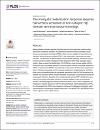The mosquito melanization response requires hierarchical activation of non-catalytic clip domain serine protease homologs.
الملخص
Serine protease cascades regulate important insect immune responses namely melanization and Toll pathway activation. An important component of these cascades are clip-domain serine protease homologs (cSPHs), which are non-catalytic, but essential for activating the enzyme prophenoloxidase (PPO) in the melanization response during septic infections. The activation of cSPHs requires their proteolytic cleavage, yet factors that control their activation and the complexity of their interactions within these cascades remain unclear. Here, we report the identification of CLIPA28 as a novel immune-related cSPH in the malaria vector Anopheles gambiae. Functional genetic analysis using RNA interference (RNAi) revealed that CLIPA28 is essential for the melanization of Plasmodium berghei parasites in refractory mosquitoes, and for mosquito resistance to fungal infections. We further show, using combined biochemical and genetic approaches, that CLIPA28 is member of a network of at least four cSPHs, whereby members are activated in a hierarchical manner following septic infections. Depletion of the complement-like protein TEP1 abolished the activation of this network after septic infections, whereas, depletion of the serine protease inhibitor 2 (SRPN2) triggered enhanced network activation, even in naïve mosquitoes, culminating in a dramatic reduction in cSPHs hemolymph levels, which paralleled that of PPO. Our data suggest that cSPHs are engaged in complex and multilayered interactions within serine protease cascades that regulate melanization, and identify TEP1 and SRPN2 as two master regulators of the cSPH network.
المجموعات
- العلوم الحيوية الطبية [847 items ]


